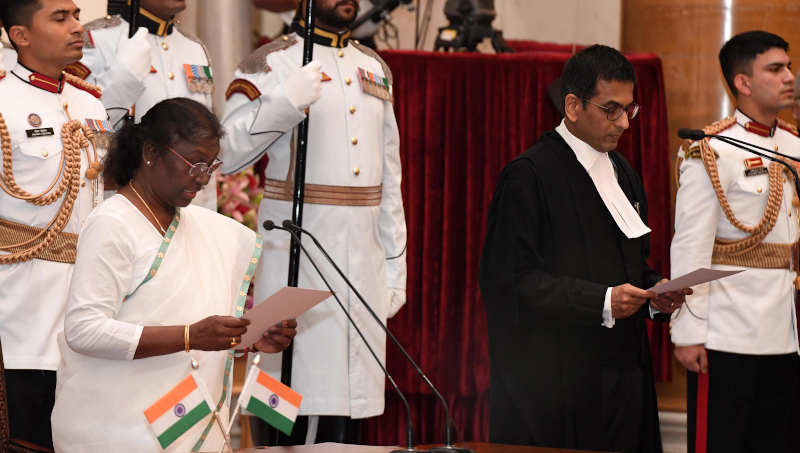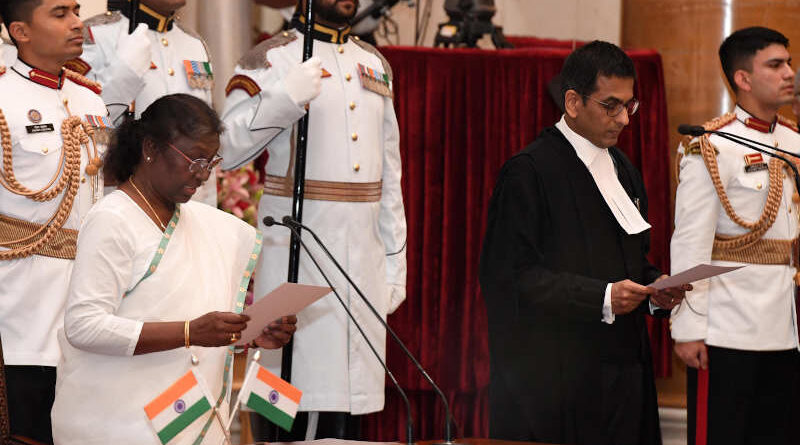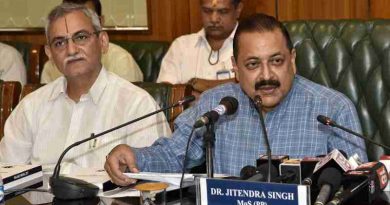Supreme Court Failure Causes More Corruption in Modi Regime

Supreme Court Failure Causes More Corruption in Modi Regime
As judicial corruption is rampant in India, the corrupt court judges are working hand in glove with the corrupt Modi regime.
By Rakesh Raman
The 2023 Corruption Perceptions Index (CPI) released on January 30, 2024 by Transparency International reveals extreme corruption in India. According to CPI, India shows score fluctuations small enough that no firm conclusions can be drawn on any significant change, but the country’s score dropped to 39 in 2023 from 40 a year ago.
That means corruption has increased in the country of 1.4 billion people. According to a Times of India report of January 30, 2024, India’s CPI rank slipped from 85 in 2022 to 93 in 2023, which indicates more corruption.
The Transparency International analysis asserts that ahead of the Lok Sabha election 2024, India sees further narrowing of civic space – which is leading to more bureaucratic, political, and judicial corruption.
With a CPI score of just 39 which is below the regional average score of 45 and the global average of 43 out of 100, India’s current rank on the Index is 93. The CPI ranks 180 countries and territories by their perceived levels of public sector corruption on a scale of zero (highly corrupt) to 100 (very clean). In other words, India is more corrupt than 92 countries, including China, Cuba, Tanzania, and Tunisia.
According to Transparency International, these weak scores reflect the lack of delivery by elected officials on anti-corruption agendas, together with crackdowns on organized civil society and attacks on freedoms of press, assembly, and association.
In its global report, Transparency International notes that corruption is increasing in those countries which are experiencing a decline in the functioning of justice systems. In this context, it cites the Rule of Law Index of the World Justice Project, which confirms the deteriorating justice delivery system in India.
According to the latest 2023 Rule of Law Index, India’s score declined from 0.50 in 2022 to 0.49 in 2023 and India ranked 79th across 142 countries in 2023 while the civil and criminal justice systems in the country are on the verge of collapse. The World Justice Project findings are consistent with the incidents of increasing judicial corruption in India.
While India is already a majoritarian nation, a senior advocate and former president of Supreme Court Bar Association, Dushyant Dave observes that the judiciary in India has also become a “majoritarian judiciary.”
In an interview on January 28, 2024 with LiveLaw news service, Dave said that the judiciary – including the Supreme Court – is remaining silent while several transgressions of law are taking place at the instance of the Executive (Modi regime). These transgressions by the judiciary are also being seen in corruption cases where the judges are complicit in state crimes.
In the Adani Group case, for example, the Supreme Court deceptively exonerated the Adani Group in the money laundering and accounting fraud case because oligarch Gautam Adani is a partner of India’s prime minister (PM) Narendra Modi. In fact, the Modi-Adani collusion case is termed as the Modani (portmanteau for Modi and Adani) corruption scandal, which is perhaps the biggest grand corruption crime in the history of mankind.
The other corruption cases in which the Indian judiciary succumbed and dishonestly protected the the Modi regime include PM-CARES Fund case, Rafale corruption case, Sri Lanka energy project case involving Adani Group, Modi-Adani collusion case, Sahara-Birla payoff case, Predator Drone deal, and a number of other cases in which Modi’s party colleagues are allegedly involved.
The Modi government (which is, in fact, Modi alone because he behaves like a dictator) is also accused of misappropriation of public money on a massive scale. The International Monetary Fund (IMF), for example, warned in December 2023 that India’s general government debt could exceed 100% of gross domestic product (GDP) in the medium term.
It also cautioned that long-term debt sustainability risks are high due to the significant investment required to meet India’s climate change mitigation targets. The country’s total debt rose to $2.47 trillion (Rs. 205 lakh crore) in September 2023. The debt under the Modi regime increased by over 174% from Rs. 58.6 lakh crore in 2014 when Modi became the PM.
In other words, severe economic disaster is imminent in India like it recently happened in Pakistan and Sri Lanka. In Modi’s rule already more than 800 million (80 crore) Indians are so poor that they cannot afford even two square meals a day. That is why they are just surviving on state dole and poverty is still increasing in the country.
But there is no transparent account of the huge debt taken by Modi during 10 years of his rule and the Supreme Court has not intervened to get this public money recovered from Modi who would have invested it secretly in the businesses of his corporate friends such as Adani.
All these cases show that the corrupt court judges are working hand in glove with the corrupt Modi regime. Since judges and ruling politicians are partners in financial crimes, judicial corruption is rampant in India and after retirement the Modi regime rewards the corrupt judges with plum positions. You can also click here to watch a video about judicial corruption and the bad state of Indian judiciary.
The judges in India are not only corrupt, but they are also naive and incompetent. While they have limited knowledge of law and decide the cases erratically based on their whims, the judges (as well as lawyers) are not quite comfortable using English in their official work because they lack English language skills. You can click here to download and read a related report: “Risks of English Language Limitations in Indian Judiciary.”
Since Indian lawyers and judges are working in a casual, free-wheeling manner, the Indian legal system is plagued by random judgments and long delays. The digital courts are not functioning at all because India is one of the most backward nations in terms of technology adoption.
If you evaluate the judgments of the Supreme Court through an Artificial Intelligence (AI)-based expert system, you will find that almost all the judgments, dismissal of petitions, or delays in decisions are either wrong or biased in favour of the Modi regime. The situation is worse in high courts and lower courts where judges are more corrupt and almost illiterate. You can click here to download and read Research Paper: 20 Bitter Truths in the Indian Legal System.
In some cases, the court judges are too scared to take action against Modi or his accomplices because they have witnessed the fate of judge Loya (Brijgopal Harikishan Loya) who had died in mysterious circumstances. In this case, Modi’s colleague Amit Shah – who is now the home minister of India – was the prime accused.
But no investigation or investigating officer can dare to point the finger at Amit Shah who controls the police and other law-enforcement agencies. Judges and investigating officers know that if judge Loya can die in an inexplicable manner, they also can be made to face the same fate. The 2023 BBC documentary ‘India: The Modi Question’ – which sheds light on Modi’s role in Gujarat violence – also terrorizes judges and other functionaries.
Obviously, most witnesses, police officers, and judges will not dare to go against the will and actions of Modi and his accomplices. In crucial cases pertaining to Modi’s opponents, the Supreme Court does not show courage to follow the law and deliver any judgment against the desire of the Modi regime.
Since some Supreme Court judges feel ashamed of their timidity, they deliver informal verbal statements against the Modi regime but never write any judgment against Modi and his belligerent colleagues. Sometimes in order to fictitiously show their impartiality in Modi-related cases, the cunning Supreme Court judges form perfunctory committees to investigate the crimes. But these committees are formed to formally exonerate Modi and his colleagues.
For example, recently it has happened in the Modi-Adani collusion case of financial fraud and the Supreme Court’s reluctance to take a punitive action against Modi’s partner Brij Bhushan Sharan Singh who is accused of sexual harassment by the women wrestlers of India.
While there are major defects and corruption in Indian courts, they repeatedly fail to tackle increasing bureaucratic and political corruption. Moreover, no government in India is willing to stop corruption because now it has become the lifeblood of Indian bureaucrats, politicians, and court judges.
As a result, all major global anti-corruption organizations observe that corruption has been increasing at an alarming pace in India while the government has no plans and procedures to stop corruption in the country.
By Rakesh Raman, who is a national award-winning journalist and social activist. He is the founder of the humanitarian organization RMN Foundation which is working in diverse areas to help the disadvantaged and distressed people in the society. He has also been publishing The Integrity Bulletin news magazine since 2018 to cover local and international corruption issues to engage with different stakeholders who are trying to combat corruption in the world.





